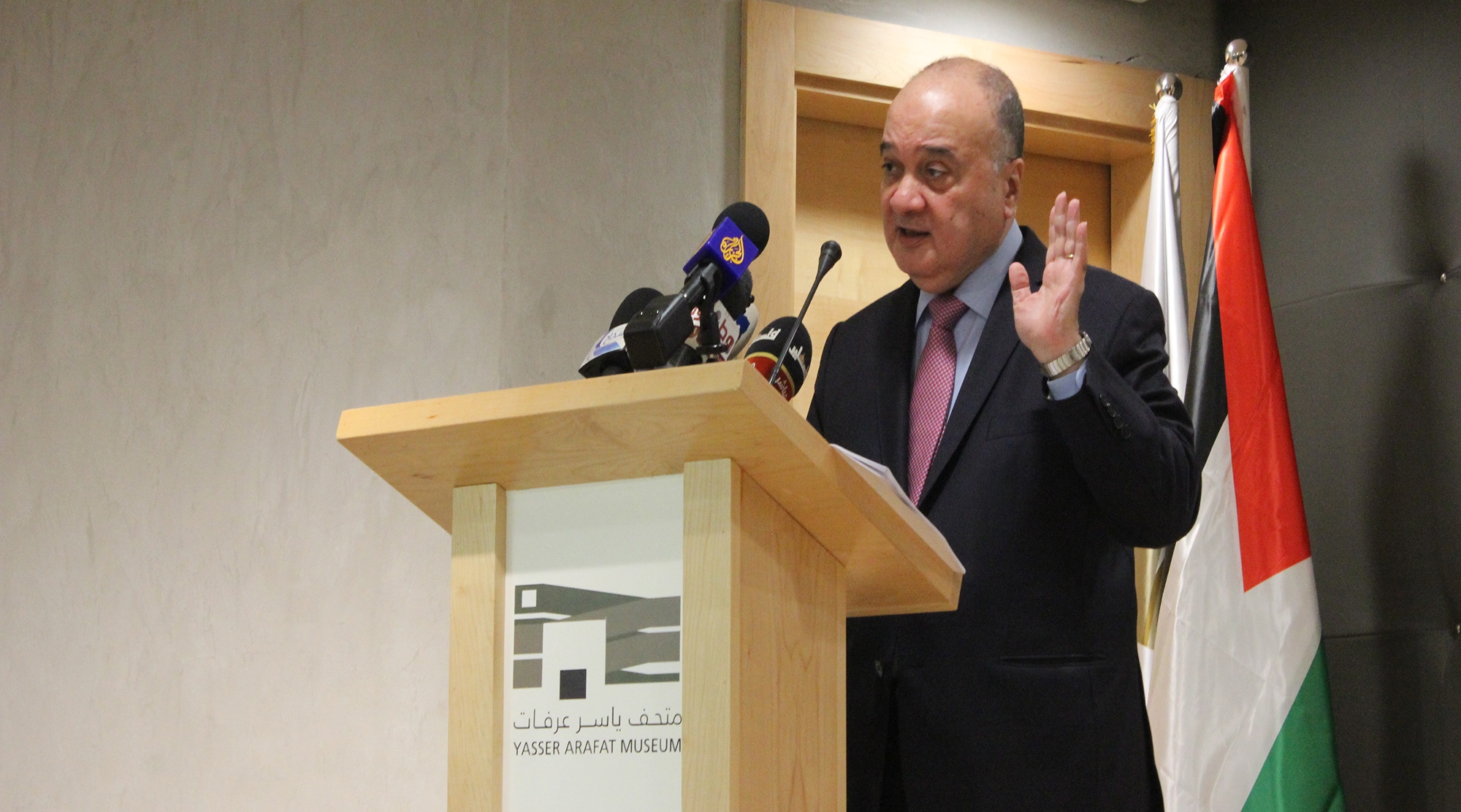Dr. Nasser Alkidwa, Chairman of the Board of Directors of Yasser Arafat Foundation and member of the Central Committee of Fatah, reaffirmed that the Palestinian people are capable of upending President Trump’s Vision (the ‘Deal of the Century’), and its negative implications, and continuing the struggle to achieve their national independence in the State of Palestine on the 1967 borders with Jerusalem as its capital, without a negotiated settlement if Israel executes any step to annex any part of the Occupied Palestinian Territory.
Alkidwa made this announcement during a political discussion organized by Yasser Arafat Foundation, “A Read on ‘Trump’s Vision’” (‘Deal of the Century’), at Yasser Arafat Museum on 3 February 2020, before an audience that included Fatah Central Committee members, ministers, ambassadors, consuls, other dignitaries, and local and international media.
Following a careful examination of the most significant points and sections of the American plan, entitled “Peace to Prosperity,” Dr. Alkidwa pronounced it not a deal of a century, not a small deal, not a peace plan, not an initiative to end the conflict, and certainly not a two-state solution. Rather it is a recitation of positions for Israeli right-wing extremists, including settlers and evangelical extremists that are consistent and complementary of previous positions of the U.S. Administration according to its Middle East policy.
AlKidwa believes that the text is all nonsense written by extremist rabbis and settler-colonists with a mad ideological vision (or who at least wielded tangible influence). The timing of the announcement of the Vision has nothing to do with establishing peace in the Middle East but serves other concerns of the American and Israeli side. Alkidwa perceives the starting point of this Vision is with all of mandatory Palestine belonging to Israel (Greater Israel), denying the existence of the Palestinian people and their national rights but attempting to find a solution for Palestinian residents within (inside) Israel in a scattered, non-sovereign entity that Palestinians could call a ‘state.’ He added, “of course the starting point also infers that there is no occupation and that all violations committed by Israel in Jerusalem and its settlement program should be legalized.”
Expressing fear that if such a vision is acted upon, Alkidwa predicted it would likely, regardless of American intentions, lead to policies to expel Palestinians and to attempt forced displacement (transfer).
Alkidwa further clarified that the essence of the so-called Vision violates all provisions of international law, the foundations of international multilateral systems, and international consensus on the basis of peaceful resolution. The Vision also contravenes adopted American policies on the Middle East and concluded agreements within the framework of the peace process. It thus encourages more grave violations [by Israel] and threatens peace.
Alkidwa affirmed that the Palestinian people and their leadership cannot accept this Vision, negotiate on its basis, or deal with it. He called on all parties who support the Palestinian cause, to achieve peace and justice and are committed to the principles of international law and foundations of world order, to take the same position and present alternatives and mechanisms to help achieve a settlement.
Alkidwa pointed out that the Conceptual Map attached to Trump’s Vision presents a caricature of what would be called the future ‘State of Palestine’. It is ambiguous and is illustrated with dotted lines between the West Bank and Gaza Strip – the meaning of which must also be understood – and that the text of the Vision contains no reference to the tunnel that is supposed to link the West Bank and the Gaza Strip. He added another important point worthy of attention in the Conceptual Map: the map of Israel is defined with clear borders with Jordan (in violation of the Jordanian-Israeli Peace Treaty) and Egypt, and with Syria after erasing the occupied Syrian Golan Heights, but with Lebanon, there is a dotted line – which suggests that Israel may change what it deems appropriate for its boundary with Lebanon.
The position of the Palestinian leadership has been very clear in rejecting this Vision, which is important and positive, but Alkidwa believes that a strategy of action, specific measures, and perhaps new teams are needed to seriously address the situation.
Alkidwa suggested a number of objectives that need to be immediately achieved:
- Serious efforts to restore political and geographic unity.
- Restructure the Palestinian Authority, not to change but to shift its functional tasks only to that of a service provider Authority, including in particular its security services: their doctrine, capabilities, and functions.
- Declare that any Israeli step to annex any part of the Occupied Palestinian Territory will be tantamount to an official declaration by Israel to end the negotiating process.
- Reaffirm our central national goal to achieve national independence in the State of Palestine on the 1967 borders with Jerusalem as its capital, and struggle to achieve that without a negotiated settlement in light of the Israeli position, and call upon the international community to support and take concrete steps to achieve national independence.
During the question and answer period following his presentation, Alkidwa affirmed that the strong Arab support of the Palestinian position in this current phase and all phases constitutes the main lever in the movement and struggle to achieve Palestinian national goals.

